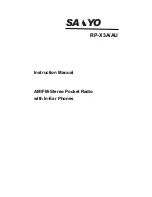
38
EAGLE - EVR-150 Installation and Operation Instructions
5-3-1 Receiving an All Ships Call (ALL SHIPS)
1. When you receive notification of an ALL SHIP call, press any key
to cancel the alert. The radio automatically selects CH16.
The priority level and the user MMSI are displayed on the screen.
If the radio recognises the user MMSI as one of your buddies, the
buddy’s name is displayed in place of the user MMSI.
2. No acknowledgement is required. Press PTT to initiate voice contact on CH16 and then
switch to a working channel.
The call data is stored in the Call Log
(see Section 5-2-7).
5-3-2 Receiving an Individual Call (INDIV)
1. When you receive notification of an
INDIV call, press any key to cancel
the alert. The radio automatically
selects the channel designated in the
incoming call. INDIV calls are almost
always Routine priority.
If the radio recognises the user MMSI as one of your buddies, the buddy’s name is
displayed in place of the user MMSI.
2. The EVR-150 responds automatically to acknowledge the incoming call.
3. The caller should respond to your acknowledgement by making voice contact on the
designated channel. If this does not happen, you can press PTT to initiate voice contact
instead.
The call data is stored in the Call Log
(see Section 5-2-7).
5-3-3 Receiving a Group Call (GROUP)
1. When you receive notification of a GROUP call, press any key
to cancel the alert. The radio automatically selects the channel
designated in the incoming call.
The priority level is always routine, and the group is identified
on the screen. The group will be one of the three groups of
frequently called people that you set up earlier
(see Section 4-3).
2. You do not need to send an acknowledgement. If desired, press PTT to initiate voice
contact on the designated channel.
The call data is stored in the Call Log
(see Section 5-2-7).
RCV: GROUP
GP: RD GROUP
FISHER2
ROUTINE
RCV: ALL SHIP
priority
TOM
ESC –> EXIT
RCV: INDIV
TOM
ENTER –> ACK
ESC –> EXIT
INDIV ACK
TOM
PRESS PTT
ESC –> EXIT
















































